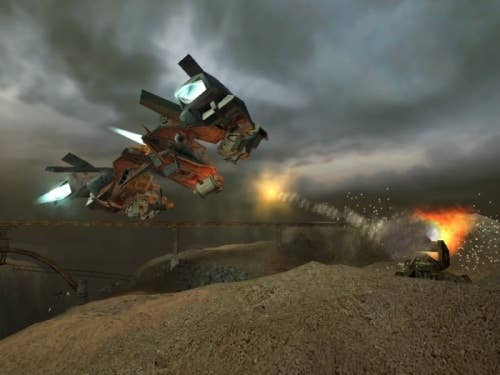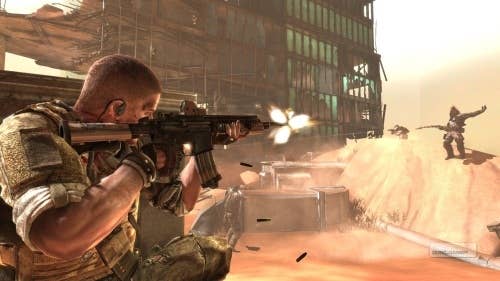Yager Bombs: Rebooting Spec Ops for 2K
Co-founder of Yager Development Timo Ullman on keeping a 100-man studio afloat with one game
Yager Development is somewhat of an anomaly, having been around for 13 years, but only shipped two games. With Yager's recent release of Spec Ops: The Line in conjunction with 2K Games, Yager Development's managing director, Timo Ullman talks about the past, present and future of the company.
"The name of the studio is what it is because we had trouble coming up with something creative," says Ullman. For those curious, the studio's first game was a flight combat game on Xbox and PC called Yager. Which they developed. It's really that simple.
"We talked about the consequences of if Yager would tank, we would have had to rename the studio," he continues. "But luckily that wasn't the case."
"Yager sold pretty well, but not enough for us to carry a studio for the next three years"
Yager Development has existed in its current form for 13 years (although the five original members started meeting and making games back in 1985), and is now a studio with approximately 100 employees. Yager, the game, was released in 2003 in Europe and Australia, and 2004 in the United States, after which the team decided it was time to move on to "next gen" systems, given they were on the horizon at the time.
This transition took some time. It included analysing its current toolset and determining that the Unreal Engine would better suit its needs, and coming up with new game concepts that would reach more consumers. As the flight combat genre more or less dried up after the Rogue Squadron series ended, Ullman noted the shift towards shooters and character-based action games we see so frequently today.
"We had a project in pre-production that unfortunately got cancelled with another publisher," says Ullman. "We did a couple of technical projects on the side too, which weren't necessarily gaming related. Yager sold pretty well, but not enough for us to carry a studio for the next three years."
It was these non-gaming projects that helped keep the studio alive and move forward, remaining in business until a more solid project went into production.

"As a gaming company, you learn a lot about - and it's a buzzword that I don't really like, but - the gamification of interfaces, like how you need to construct the menu for people to respond to it in a fluid way. So we took these things we learned in games and applied them to other types of industries," says Ullman.
Production of Spec Ops: The Line didn't kick off into full swing until 2007, and initially, it wasn't even a Spec Ops game. "We had approached 2K in 2006 with a project of our own, which was a third person game with squad and cover mechanics," said Ullman.
While 2K liked the initial pitch, unbeknownst to Yager, they had internally green-lit the revival of Spec Ops, and asked if the developer would be interested in re-pitching a game in the Spec Ops realm.
"The best way to prepare for the worst case scenario is you put a lot of energy and love into the game you're doing, because that's the next thing people will judge you by"
While a flattering proposition, Ullman said it was not quite what the developer had in mind. Until, that is, 2K uttered the magic words, "There are no restrictions." Ultimately, so long as it was a Spec Ops game and military themed, Yager had carte blanche.
All of the studio's founders and about half of the team who worked on Yager went on to develop Spec Ops: The Line. Ullman pointed toward Spec Ops' lead programmer, Andre-Dittrich, as an example of its studio culture of professional development. He started as an intern on Yager.
As Spec Ops: The Line stands now, the basic mechanics of the game are more or less based on the original pitch, "but everything else is new. Emphasis on the story came a little later, when we were already in production."
According to Ullman, getting the story right was one of the main reasons Spec Ops: The Line was pushed so far back after its public unveiling in 2009. "We obviously worked on the whole game including the visuals, but that and the story were the areas that got much of the attention and work. The consequence was that it took much longer than expected to come up with something that works from start to finish."
Part of "getting the story right" included a change in approach from the initial vision.
Yager Development is a Germany-based studio, but doesn't consider itself a "German company." With 30-40 per cent of its staff coming from around the world - including the US, all over Europe and China - the team language has been English since 2007.
As a result, it "initially tried to use German writers, but it didn't work out. We felt like we needed to have an American writer to make it work, it had to do with knowing the finer details of the language."
Writing a good story in Germany for an English speaking audience, it would seem, is quite challenging.

Yager worked with 2K to come up with a narrative that everyone was happy with. This resulted from bringing in Walt Williams, a writer for 2K who was the main writer on Spec Ops who, along with Richard Percy, "lived in Berlin for some time to work together and get all the dialogue right."
The story then went through many iterations, "because our goal was to really tie it into the game." For Yager, this didn't simply mean cramming dialogue into the existing framework. It meant that whenever dialogue or story changes were required they would "have to go back to that specific level and give the character room to actually play the dialogue so it doesn't feel forced".
"I remember when we started out, we said, 'OK, we want to have violence as part of the game, but it shouldn't feel cheesy, or be there just for the sake of being uber-violent,'" says Ullman. "So we said that everything the player does needs to be motivated by the story."
Based off current criticisms of Spec Ops: The Line, of which many point to the game's story as being one of its strongest points, it's a move that paid off.
"With a studio our size it wouldn't be wise for us to put all our bets on one game," said Ullman. "We do have more things that we're doing on top of Spec Ops that I can't go into, but it's not a no-brainer that an independent studio like ours will be around forever."
"I'm less keen on letting a new hardware cycle begin, but from a technical point of view, I think what's coming sounds pretty promising"
Despite the occasional extra-curricular activities, Ullman points out that as Yager is a studio which is primarily focused on a single project and a lot of its future is riding on the success of Spec Ops: The Line.
"We're convinced that Spec Ops will do well, but it's not a given," he said. "You never know how the consumer will respond, or whether it's a good time of year to release a game like this. There are just too many factors that you, as a developer, don't have control over.
"I think the best way to prepare for the worst case scenario, is you put a lot of energy and love, blood, sweat and tears into the game you're doing, because that's the next thing people will judge you by."
When Yager Development finished work on Yager the game, it decided to move into development on the current generation of console hardware and PCs. Ullman says that he and the team are very happy with the results they've come up with.

"I think we're using it to its capacity. It might sound a bit philosophical, but there's always something you can be doing better next time, there's always room for optimisation. Not a huge amount, but I think we're using the current platforms to the max to get Spec Ops running."
Despite being unsure of the sales success of Spec Ops: The Line, Yager is aware - as many developers should be - that the market for video games is huge right now, and is constantly growing. There are many different business models around, and Ullman says they're "putting a lot of attention and looking at what's going on" in this respect.
However, given so much time and effort has gone into developing a single game for this generation so far, Ullman says Yager would prefer if they were able to stay here a little bit longer.
"There's a big market out there, and people are still interested in fresh concepts or new takes on established genres. I'm less keen on letting a new hardware cycle begin, but from a technical point of view, I think what's coming sounds pretty promising. While I can't comment on what we're doing next right now, it's fair to say we are preparing for the future."
